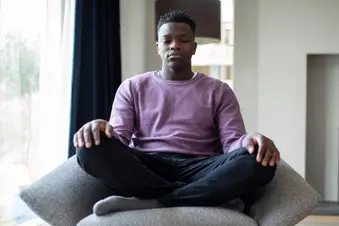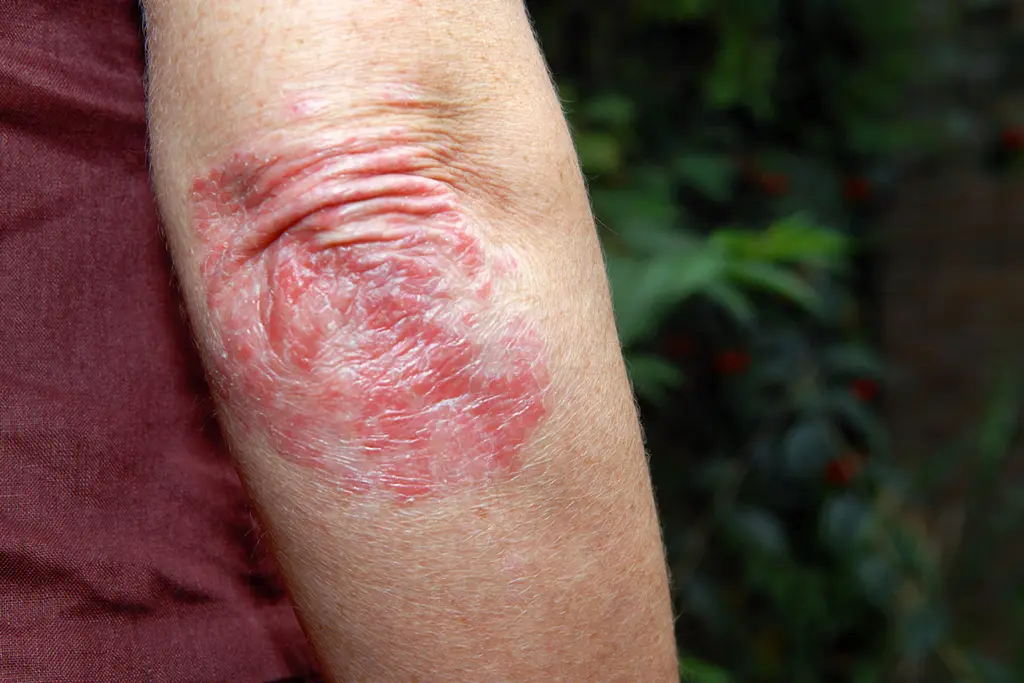
Living with psoriasis can feel isolating, but there are things you can do to ease your anxiety and feel better about your skin.
Try these tips to improve your outlook and live a full life with psoriasis.
Put yourself in the driver’s seat.
Instead of feeling like psoriasis is running your life, flip the switch. Empower yourself to understand and manage your psoriasis better.
Educate yourself about your disease. Learn about common challenges and how to manage them. Find your triggers so you can avoid them and prevent flares. Learn about treatments that may help.
Think of your doctor as part of your team. Work together on a treatment plan, then stick to it.
Help reduce stigma.
Many people don’t know the facts about psoriasis. They may think it’s contagious. They may assume it’s an infection.
Help them understand it’s a chronic condition and they can’t catch it from you. This helps reduce the stigma of psoriasis and helps them better understand you.
Stop negative thoughts.
Pay attention to thoughts that make you feel worse, then turn them around. Negative thoughts may involve a worst-case scenario, overgeneralizing, or attaching your thoughts and feelings to other people. Write a different inner script.
For example, if someone makes a rude comment, instead of assuming everyone has something negative to say, remind yourself it’s just one person. If someone doesn’t sit next to you, don’t assume it’s because they don’t want to be near your skin. Understand that they may simply prefer a seat with a different view.
Prioritize your well-being.
Self-care can help you feel better about yourself and your psoriasis.
Take good care of your skin. Follow your doctor’s treatment plan. Eat whole, healthy foods. Be active on a regular basis. Avoid tobacco, alcohol, and drugs. Get enough sleep.
If symptoms and stress keep you up at night, try these techniques for a better sleep:
- Take a bath before bed.
- Try relaxation techniques like deep breathing and muscle relaxation.
- Keep a consistent bedtime.
- Avoid coffee, tea, and other caffeinated drinks before bed.
Dress for success.
If certain clothes make you feel itchy, uncomfortable, or self-conscious, leave them in the drawer. Choose something that helps you feel your best instead.
A layer of moisturizer topped with the right clothes and fabrics can make a big difference in how you feel about being out in the world.
Try a coverup.
Makeup can help you conceal a flare.
Try these steps:
- Prep your skin. Use a gentle cleanser, remove flakes, then apply moisturizer and primer.
- Apply and blend in a color-correcting foundation in a liquid or cream with a yellow or green tone.
- Apply pressed powder with a brush to set the makeup.
Stay away from makeup with shine or sparkle. Opt for smooth looks instead of glitter or highlighter, which may irritate your skin and make psoriasis more noticeable.
Lower your stress.
Stress and anxiety make it challenging to handle difficult feelings. And while stress doesn’t cause psoriasis, it may trigger a flare and make itching worse.
Try these techniques to ease your anxiety and lower stress:
- Breathing exercises. Breathe in slowly for a count of five while filling your belly with air. Breathe out slowly for a count of five. Try to let air flow in and out evenly.
- Muscle relaxation. Focus on one muscle group at a time. One by one, relax each muscle group.
- Visual imagery. Picture something that helps you feel relaxed. You can return to this image anytime you feel fear and stress coming on to replace them with feelings of calm.
Get help if you feel depressed.
If you feel symptoms of depression or anxiety, like a persistent sad or anxious mood, talk to a mental health provider. Your doctor can recommend a counselor or therapist.
Talk about it.
Try to express your thoughts and feelings. Keeping your feelings all bottled up inside can lead to more stress and tension.
Talk to your friends and family, support group members, or your doctor. Start a journal and write about what’s on your mind.
Help your friends and family understand what you’re going through. Don’t avoid talking about it. Remember that people who care about you also want to support you.
Join a support group.
Being part of a psoriasis support group, whether online or in person, can provide support and help you cope with struggles.
Sharing your thoughts and experiences with others who understand what you’re going through can help you feel less alone. You can also get tips and ideas for how to handle the challenges of psoriasis.
Embrace new relationships openly.
If you feel nervous about starting a new relationship, try an open approach.
Start with the facts. Tell your partner you have psoriasis and explain what it is. Show them what it looks like and answer their questions.
Being honest will help your partner be the same way. It may also help you feel less embarrassed and more relaxed.
Handle others’ reactions with confidence.
Some people have never seen psoriasis, so they may react in uncomfortable ways. Try to remember they don’t know what to do or say.
Create a short script to use when you notice an uncomfortable reaction. Try something short and sweet, like, “I have a skin condition called psoriasis. It’s not contagious.”
If they keep staring, it’s OK to ask them to stop. Try something like, “I prefer it if you don’t stare.” Direct eye contact with a nod or a smile often works. If it doesn’t, try a frown, which may be the wakeup call they need.
If someone is rude and makes mean comments, look at them directly with firmness and confidence. This can be very effective. In fact, projecting confidence may prevent negative comments in the first place.
Try a new mindset.
Let go of what others think. It may sound simplistic, but many people with psoriasis say the best thing they ever did was stop worrying about other people’s opinions. Turning around your mindset can make a big difference in how you feel about living with the condition.
Show Sources
Photo Credit: Daisy-Daisy / Getty Images
SOURCES:
American Institute of Stress: “Management Tips.”
Anxiety and Depression Association of America: “Symptoms.”
Mayo Clinic: “Psoriasis and Your Self-Esteem.”
National Psoriasis Foundation: “Life with Psoriasis.”
Psoriasis Association: “Forum: Talk About Treatments.”
Psoriasis and Psoriatic Arthritis Alliance: “Psychological Aspects of Psoriasis.”

